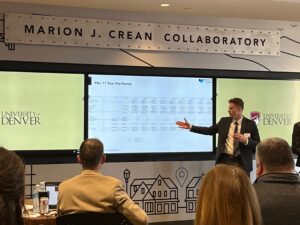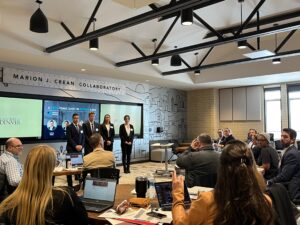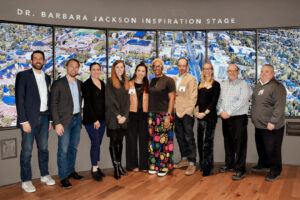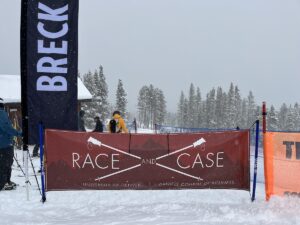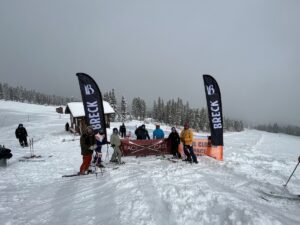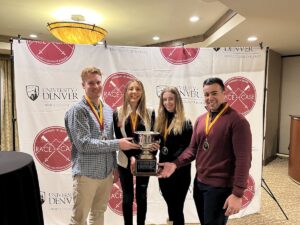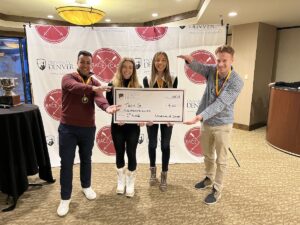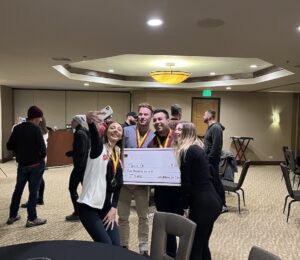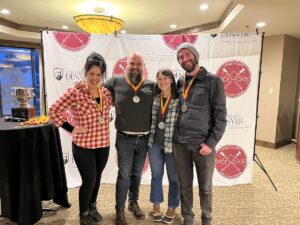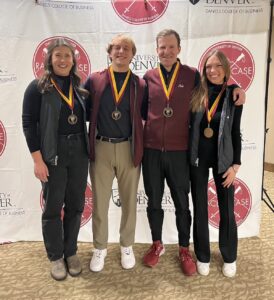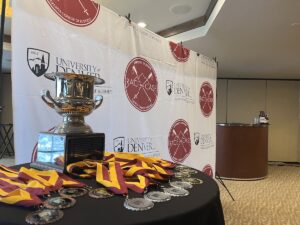Daniels hosted its yearly business case and ski competition in Breckenridge in January
What do you get when you mix a business case competition with a ski race on the slopes of Breckenridge?
“It’s the most quintessential Colorado thing you can possibly do, and I’m here for it,” said Alex Glasson, a Denver MBA student at the Daniels College of Business.
Each year, Daniels hosts teams from around the country in a premier business ethics case competition and alpine ski challenge rolled into one. Daniels students thought up the unique idea in 2003. In the years since, Race and Case has grown into a nationally recognized event.
The 2023 edition invited teams from the University of Florida, University of Alabama, Auburn University and the University of Denver to compete in the classroom and on the course. On Friday, Jan. 27, each group was tasked with providing recommendations on a fictitious business case, “Wallace Hospital: Seeking Growth in an Age of Crypto Crisis and Global Economic Turbulence,” authored by Daniels Associate Professor of Management Vijaya Zinnoury.
The case, challenged students to help the hospital avoid a PR nightmare around crypto donations, find growth without compromising Wallace’s human-centric culture and consider the ethical implications of those recommendations.
Leadership from Englewood, Colorado-based Craig Hospital helped create the case. Jim Beaudry, special projects coordinator to the CEO, was one of the judges in attendance for the presentations. Beaudry said Craig was happy to help put on this unique event and that he was thoroughly impressed by the student pitches.
“This is a way we can help students figure out some of the complexity of business, particularly health care, and how to tackle not the obvious problems, but the intangibles,” he said.
Beaudry added that the students gave him “hope for the future” with their quality thinking and preparation.
This was Anthony Marquardt’s second year judging Race and Case—after his experience at last year’s event, he made it a priority to come back. Marquardt, general manager at Slalom Consulting, said he was even taking notes on the student ideas and expects to use them in his own business.
“The students are amazing, [especially] their perspective and how they think about business,” he said. “Supporting that growth and watching them come up with amazing ideas is inspiring.”
Marquardt added that the networking he did with the other judges is a crucial component of Race and Case. Daniels invited a star-studded cast of judges across various industries and roles to help judge the business case, which accounted for 90% of each team’s final score.
The remaining 10% was determined on a snowy racecourse at Breckenridge Ski Resort on Saturday, Jan. 28, where Vail Resorts provided the lift tickets in kind. Amid a snow globe-like atmosphere, students from each of the competing teams took turns carving down the course as their times were triumphantly announced at the top of the track. Daniels part-time MBA students Derek Zylstra and Caroline Lang took home the fastest times on the course.
When all was said and done, the team from the University of Florida took home the top prize, narrowly edging out a second-place team from Daniels. The University of Alabama placed third. Florida’s team of Paxton Shamlou, Joshua Geller, Charline Pommeret and Brody Lee earned the $5,000 grand prize.
Shamlou said the team was ecstatic to raise the Daniels Cup after working hard for the past three weeks on its case presentation. Race and Case has also been on her radar for a while.
“I knew about Race and Case when I applied to the UF MBA, and it’s something that drew me to the program,” she said. “This is a really amazing opportunity.”
After a year away from the podium, a team from Daniels landed the $3,000 second place prize thanks to a strong performance in the classroom and on the slopes. The team of DMBA students set to graduate in 2024 included Glasson, Mary-Margaret Koch, KT Peek and Strother Gaines.
Koch said the group approached the case with a unique perspective, as only Glasson had a prior business background. Together, they melded that business knowledge with expertise in the biology, nonprofit, health care and theater industries to offer recommendations on the case.
“Our different backgrounds really helped,” Koch said.
Alabama’s third place team of Price Dukes, McKenzie Huckaby, James Kelley and Aija Abele took home a $2,500 prize for their bronze medal finish.

